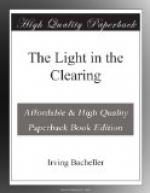“The way I look at it is this,” said he. “We’re young fellows and making a good deal of money and we can’t tell when we’ll die and leave a lot that we’ll never get any good of.”
It was a down-country, aristocratic view of the responsibilities of youth and quite new to me. Caligula was worried in a like manner, I believe. We had near us there a little section of the old world which was trying, in a half-hearted fashion, to maintain itself in the midst of a democracy. It was the manorial life of the patroons—a relic of ancient feudalism which had its beginning in 1629, when The West Indies Company issued its charter of Privileges and Exemptions. That charter offered to any member of the company who should, within four years, bring fifty adults to the New Netherlands and establish them along the Hudson, a liberal grant of land, to be called a manor, of which the owner or patroon should be full proprietor and chief magistrate. The settlers were to be exempt from taxation for ten years, but under bond to stay in one place and develop it. In the beginning the patroon built houses and barns and furnished cattle, seed and tools. The tenants for themselves and their heirs agreed to pay him a fixed rent forever in stock and produce and, further, to grind at the owner’s mill and neither to hunt nor fish.
Judge Westbrook, in whose office I worked, was counsel and collector for the patroons, notably for the manors of Livingston and Van Renssalaer—two little kingdoms in the heart of the great republic.
I spent two years at my work and studied in the office of the learned judge with an ever-present but diminishing sense of homesickness. I belonged to the bowling and athletic club and had many friends.
Mr. Louis Latour, of Jefferson County, whom I had met in the company of Mr. Dunkelberg, came during my last year there to study law in the office of the judge, a privilege for which he was indebted to the influence of Senator Wright, I understood. He was a gay Lothario, always boasting of his love affairs, and I had little to do with him.
One day in May near the end of my two years in Cobleskill Judge Westbrook gave me two writs to serve on settlers in the neighborhood of Baldwin Heights for non-payment of rent. He told me what I knew, that there was bitter feeling against the patroons in that vicinity and that I might encounter opposition to the service of the writs. If so I was not to press the matter, but bring them back and he would give them to the sheriff.
“I do not insist on your taking this task upon you,” he added. “I want a man of tact to go and talk with these people and get their point of view. If you don’t care to undertake it I’ll send another man.”
“I think that I would enjoy the task,” I said in ignorance of that hornet’s nest back in the hills.
“Take Purvis with you,” he said. “He can take care of the horses, and as those back-country folk are a little lawless it will be just as well to have a witness with you. They tell me that Purvis is a man of nerve and vigor.”




